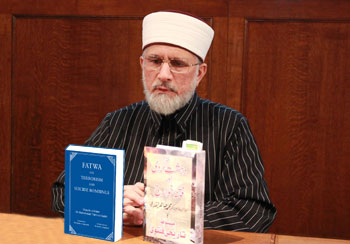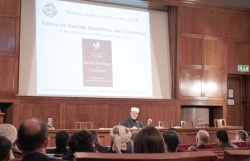Fatwa on Terrorism
Fatwa on Terrorism is a 600-page (Urdu version), 512-page (English version) Islamic decree by Shaykh ul Islam Dr. Muhammad Tahir-ul-Qadri which demonstrates from the Quran and Sunnah that terrorism and suicide bombings are so unjust that their evil is un-Islamic. It is published from London as a book.[1] The English edition was published in the UK by Minhaj-ul-Quran Publications. Shaykh ul Islam released the fatwa on 2 March 2010.[2] This fatwa is a direct refutation of the ideology of Al-Qaeda and the Taliban]]. It is one of the most extensive Islamic anti-terrorism rulings, an "absolute" condemnation of terrorism without "any excuses or pretexts" which goes further than ever and declares that terrorism is kufr under Sharia (Islamic Law).[3] The launch was organised by Minhaj-ul-Quran UK. Dr. Tahir ul Qadri said during the launch that "Terrorism is terrorism, violence is violence and it has no place in Islamic teaching and no justification can be provided for it, or any kind of excuses or ifs or buts."
The fatwa received widespread media attention and was positively covered by the international press.[4]
According to CNN, experts see the fatwa as a significant blow to terrorist recruiting.[5] CNN's Amanpour show added the fatwa summary to its website and declared it to be fatwa for peace.[6] while the US State Department declares the fatwa to be significant step in taking Islam back from terrorists.[7]
Douglas Murray (author) has also supported the Fatwa on Terrorism in an article published by the Evening Standard.[8]
ITV news channel questioned the credibility of the fatwa and asks if it was not by the British government because senior counter-terrorism officials from Scotland Yard and MI5 were present at the launch.[9]
The 512-page English book version of the fatwa — Fatwa on Terrorism and Suicide Bombings — (London: Minhaj-ul-Quran, 2011. ISBN 13-978-0-95518-889-3) has a foreword by John Esposito and an introduction by Joel Hayward, both of whom share Qadri's scholarly assessment that, regardless of any intention, the evil of terrorism remains evil and must be exposed, opposed and condemned.[10]
The Fatwa on Terrorism has been officially endorsed by Al-Azhar University in Cairo, Egypt.[11][12] In January 2011, the fatwa was discussed at the World Economic Forum Annual Meeting 2011.[13] In June 2011, Pope Benedict XVI received a copy of the fatwa from representatives of Minhaj Interfaith Relations. The Pope reportedly appreciated that it promoted peace, harmony and interfaith dialogue.[14][15]
References
- ↑ Fatwa on Terrorism & Suicide Bombings BOOK
- ↑ Influential Pakistani cleric based in GTA
- ↑ Sheikh issues fatwa against all terrorists
- ↑ Tahir ul-Qadri and the difficulty of reporting on fatwas
- ↑ Some experts see fatwa as significant blow to terrorist recruiting
- ↑ Amanpour - Fatwa for Peace
- ↑ Muslim leader's edict decries terrorism: U.S. hails 'taking back Islam'
- ↑ Why this fatwa for peace matters so much to us all
- ↑ Fatwa condemns terror
- ↑ English version of published Fatwa on Terrorism
- ↑ Al-Azhar University Certification
- ↑ Al-Azhar University Certification
- ↑ The Reality of Terrorism at WEF
- ↑ Minhaj man meets Pope
- ↑ Fatwa on Terrorism presented to Pope Benedict XVI in Vatican City
External links
- Fatwa on Terrorism, Read Online - English
- Fatwa on Terrorism, Read Online - Urdu
- Islamic scholar Tahir ul-Qadri issues terrorism fatwa
- Muslim leader's edict decries terrorism: U.S. hails 'taking back Islam'
- Tahir ul-Qadri and the difficulty of reporting on fatwas
- Global Media Coverage of Fatwa on Terrorism
- The Reality of Terrorism at WEF 2011
- The Fatwa on Terrorism and Suicide Bombings - book details
- The Fatwa on Terrorism and Suicide Bombings - free downloadable PDF
- Young Turks : Where are the Fatwas?
- VOA News : Fatwa Issued Against Terrorism
- NY Daily News : Top Muslim scholar launches 600-page jihad AGAINST terror
- The Hindu : Muslim scholar issues ‘fatwa’ condemning al-Qaeda terrorism
- Guardian UK : Fatwas can be a force for good
- One India News : Pakistani Islamic scholar to issue 600-page fatwa against terrorism, suicide bombing
- Intellectual Conservative : Muslim Cleric Issues Fatwa Against Terrorism
- Geo News : Tahir-ul-Qadri declares suicide attacks ‘un-Islamic’

